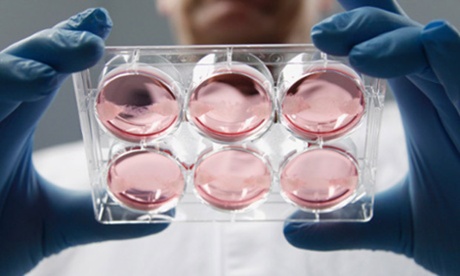Simon McKeon says research fund has been embraced and a ‘funding peace package’ must be reached

Researchers and scientists may take to the streets to protest if the government’s proposed $20bn medical research fund falls foul of wrangling over the budget, the chair of a review into Australia’s health and medical research has said.
Simon McKeon said the fund, which would be paid for by the $7 GP co-payment proposed in Joe Hockey’s May budget, had been embraced by the medical and research community and a “funding peace package” needed to be reached.
But with Senate opposition threatening to block the co-payment measure, McKeon warned in a speech to the National Press Club in Canberra on Wednesday, “To anyone who simply says no funding of it is more important than the fund itself, anyone who simply says if we can’t get our way with this there ought to be no fund, I suspect we may then see lab coats [protesting] in the streets. Because it’s simply gone down so well at this point.
The health and research community is quietly hoping Canberra will sort it out, those opposing views.”
McKeon said he considered it a positive there was so little detail surrounding the fund, as the government had time to consult widely and get it right.
“It would be a tragedy if the fund did not happen simply because the funding mechanism was not agreed to in parliament, and what I hope is that everyone who has a role in manufacturing how this fund is actually funded considers that very, very carefully,” he said.
“The government is saying, quite correctly, if we don’t do anything to our health system, it is unsustainable. They’re absolutely right. The real question is whether this co-payment is the most sensible way … It’s their right to propose it. My own view, for what it’s worth, is the medical research future fund is going to get up. I don’t know quite what the next few weeks or months hold, in relation to the funding solution. There will be, I suspect, some give and take.”
The $20bn fund was announced in the Abbott government’s first budget, to be funded by $5 of the proposed $7 GP co-payment, with the remaining $2 going to the doctor. There has been scant detail around how the fund will be structured and what type of research it will fund, with the treasurer, Joe Hockey, citing Alzheimer’s and cancer as potential subjects.
McKeon said he personally had “no problem” with a GP co-payment but had a big problem with ensuring the mechanism does not place an unfair burden on people who are financially disadvantaged.
When asked if he had any concerns about Australia’s medical researchers and scientists moving overseas as their budgets were cut in Australia, McKeon replied: “My hope is that a future fund would be established sooner rather than later and I would be confident, others may disagree, I would be confident medical researchers will hang around.”
McKeon was the chair of the previous Labor government’s strategic review of health and medical research, which delivered a 300-page report to then health minister Tanya Plibersek last year. During his address to the NPC, McKeon referenced the review, saying it found health economics was relatively underdeveloped in Australia, and at the end of the review the panel was unable to answer the fundamental question of how much was being spent on medical research because data was so “murky”.
“Yes, we need a cure for cancer, as has been emphasised by the treasurer, but frankly the intelligent approach which will generate superior returns for the health of a nation, let alone the health of our economy, necessitates a broader focus,” he said.
McKeon said there was no disagreement in the medical research community that the fund should have a broad focus.
“In Australia, we occasionally refer to ourselves as the “clever country”. With respect, we are kidding ourselves. We have patches of sheer, world-leading brilliance, including among our health and medical specialists. But culturally, we are distinguished by our love of sport, which is a wonderful thing, and the world records we hold for the size of our homes,” he said.
“As so, whilst we may not be the clever country today, I believe we are the lucky country, indeed the luckiest country. But for all our natural resources of space, pristine landscapes, minerals, energy, lack of bordering nations – combined with being part of Asia and [our] rich multicultural heritage – success or greatness is far from assured … rewards that come from investing in our minds, in our abilities, in our potential are much more within our control.”
